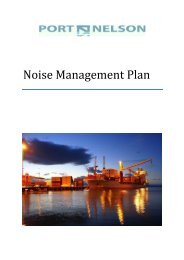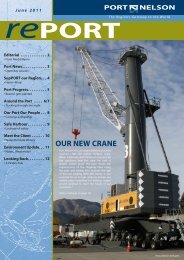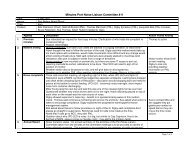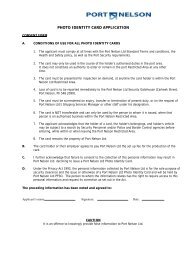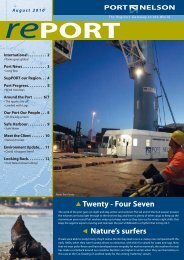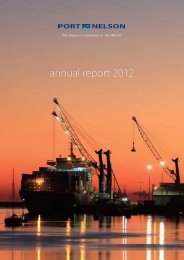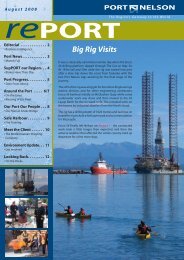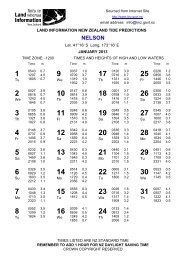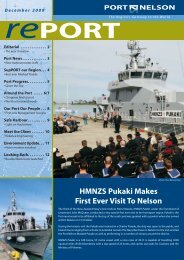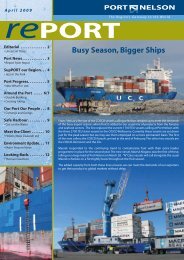Port Nelson Annual Report 2007 (pdf)
Port Nelson Annual Report 2007 (pdf)
Port Nelson Annual Report 2007 (pdf)
Create successful ePaper yourself
Turn your PDF publications into a flip-book with our unique Google optimized e-Paper software.
C H I E F E X E C U T I V E ’ S R E P O R T<br />
6<br />
C A R G O<br />
Volumes through <strong>Port</strong> <strong>Nelson</strong> for the year<br />
were the highest on record with logs,<br />
motor vehicles, wine and dairy products<br />
being particularly strong performers.<br />
Total throughput for the 12 month period<br />
was 2,644,000 tonnes, some 89,000<br />
tonnes ahead of budget and around 122,000 tonnes up on the<br />
previous year.<br />
Log exports for the year were 22,000 tonnes ahead of budget at<br />
636,000 tonnes and reflected the strong overseas demand for wood<br />
throughout the majority of the financial year. Imported motor<br />
vehicles (new and used) totalled 167,000 revenue tonnes as against<br />
a budget of 136,000 tonnes and dairy (21,000 tonnes) and wine<br />
(30,000 tonnes) also showed healthy increases on the figures twelve<br />
months earlier.<br />
Processed forestry exports were some 60,000 tonnes below budget,<br />
with fruit exports and fertiliser and cement imports also being slightly<br />
lower than had been anticipated.<br />
Container numbers significantly increased once again with 71,815<br />
TEU handled during that period as against 61,455 TEU twelve<br />
months earlier.<br />
This increase was on the back of a number of factors including the<br />
following:<br />
• Greater volumes of sawn timber being shipped in containers rather<br />
than in break bulk form, particularly to the Asian region<br />
• Increased wine and dairy exports through the port<br />
• A further increase in LVL and MDF products being loaded into<br />
containers.<br />
S H I P P I N G<br />
Vessel arrivals were marginally lower with 1,001 vessels calling during<br />
the year as against 1,012 the previous year.<br />
In late December the fortnightly Tasman Orient Line (TOL) service<br />
ceased calling on the back of the traditional cargo base for this<br />
service moving principally to containers and around the same time<br />
the monthly Indotrans break bulk service to the US also ceased. In<br />
mid June the regular Maersk relay service to Asia also ceased as part<br />
of a nationwide review of their feedering service where they chose<br />
to commence utilising transhipment operations with existing coastal<br />
operators.<br />
S T O R A G E / R E C E I V A L A N D D E L I V E R Y /<br />
Q U A Y P A C K<br />
The purchase of land previously leased by a third party on the western<br />
side of Hay St in the second half of 2006 enabled us to secure extra<br />
land for the storage of containers, which was urgently needed given<br />
the significant growth in container traffic. Space was particularly<br />
at a premium during the <strong>2007</strong> fruit export season and the efficient<br />
operation of the Container Yard and Receiving and Delivery (R & D)<br />
systems was a credit to all the staff involved in the cargo logistics<br />
division of the business.<br />
Our Quaypack division continues to go from strength to strength with<br />
its packing and unpacking operations. The growth of wood products<br />
moving into containers has certainly seen added demand for their<br />
services.<br />
In late 2006 our Cargo Team moved into the ‘One Gate’ facility on<br />
Carkeek Street. The completion of this project on time and under<br />
budget was a credit to all involved. The benefits of having all cargo<br />
staff in one area have been everything we had hoped for and have<br />
certainly assisted us during the busy peaks we experience from March<br />
through to June.<br />
S T E V E D O R I N G<br />
In late 2006 a review was undertaken of our Stevedoring division,<br />
Tasman Bay Stevedoring (TBS) to ascertain how we could improve the<br />
performance of what has been for some time a marginal business. It is<br />
fair to say that all stevedoring companies in <strong>Nelson</strong> have a reputation<br />
for high levels of service and efficiency of operation but historically this<br />
service has not attracted the returns available for similar operations in<br />
other New Zealand ports. TBS has since worked through various issues<br />
to achieve mutual benefits, where our major customers know they<br />
have longevity of service and at the same time TBS is assured of the<br />
return that makes it worthwhile staying in this line of work. A huge<br />
amount of credit must go to Chris Shand, Digby Kynaston and the TBS<br />
team who have worked so hard in meeting the targets laid down for<br />
them, and I also express my sincere thanks for the efforts of our Chief<br />
Commercial Officer, Parke Pittar, in driving this review process.<br />
E N V I R O N M E N T A L I S S U E S<br />
The Noise variation to the <strong>Nelson</strong> City Council Resource Management<br />
Plan was notified in early June this year and we expect to commence<br />
noise mitigation work on the affected properties in the coming<br />
months. While no solution will ever meet with universal support we



